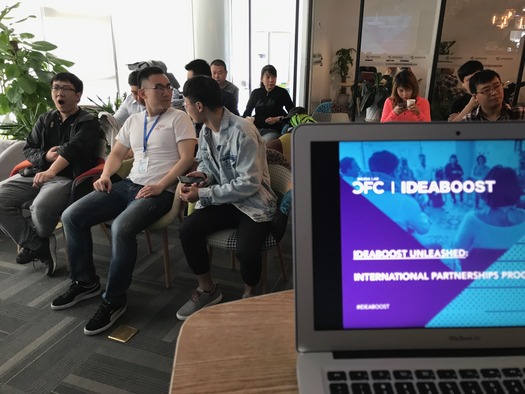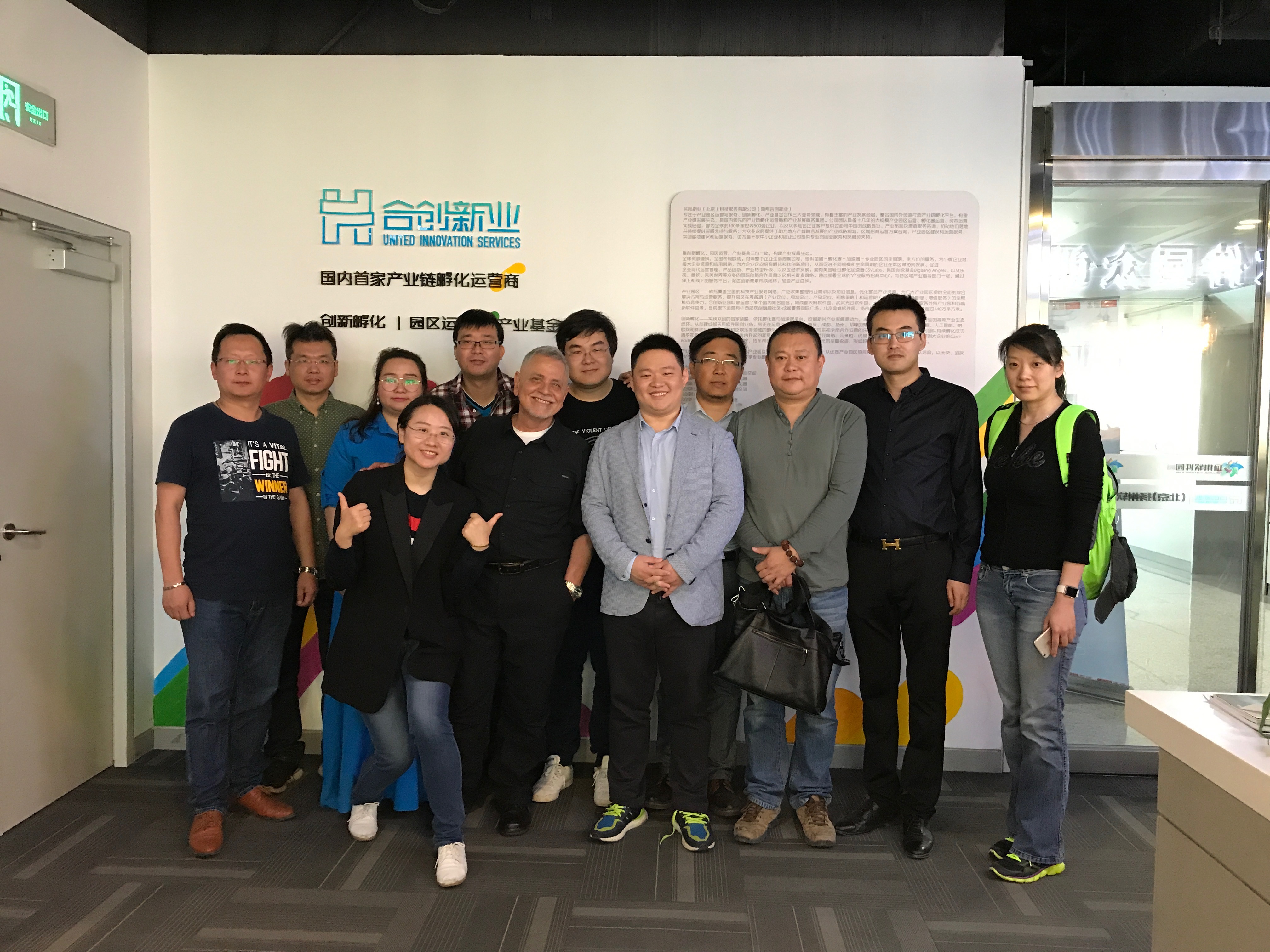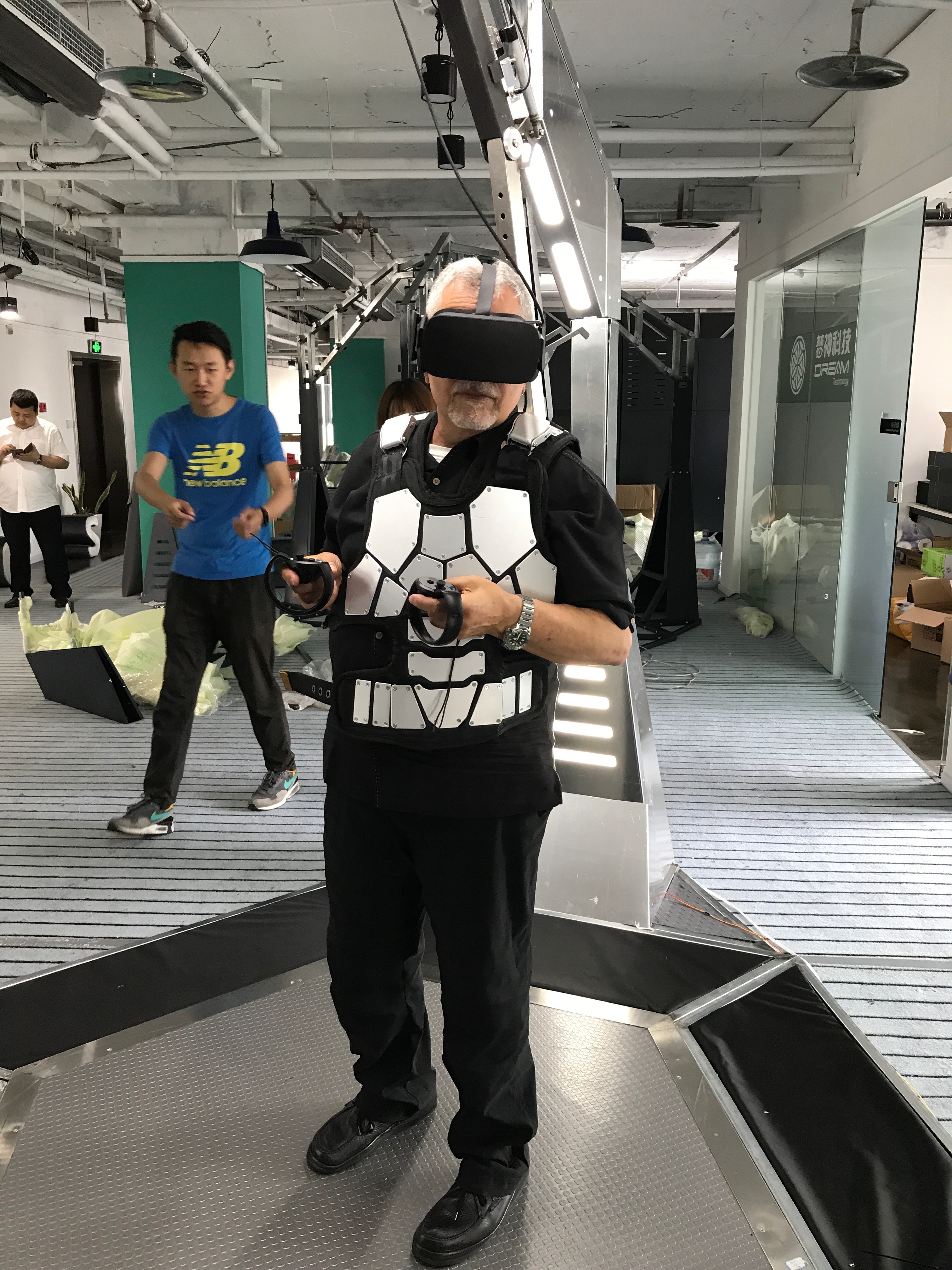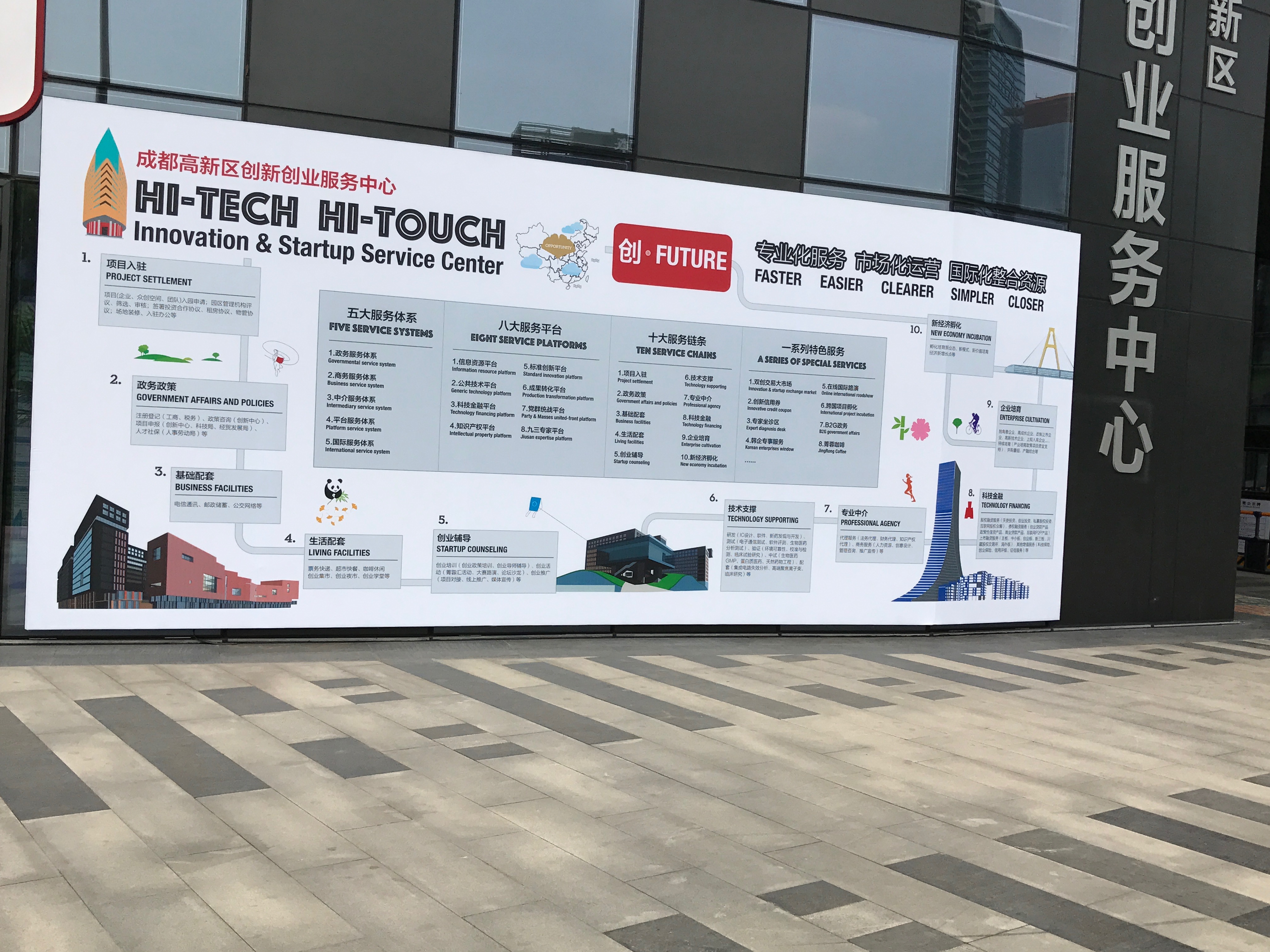Entrepreneurship in China
 Monday, May 22, 2017 at 1:34 PM by
Monday, May 22, 2017 at 1:34 PM by  Nick DeMartino
Nick DeMartino China intends to win at yet one more key component of modern capitalism, entrepreneurship and the startup culture, as it has most certainly done in other areas of competition. Between 2000 and 2013, China’s non-state-owned business sector increased 18-fold, compared with the state sector that grew six-fold. Official government policy has strongly supported innovation and entrepreneurial enterprises in recent years. It is kind of mind-blowing to grasp the fact that this Communist-run economy may be the most successful capitalist in world history.
I say a few words at the pitch session during the Global Entrepreneurship Incubation Summit in Chengdu, China.I learned many nuances of the Chinese startup ecosystem during a ten-day trip, during which I visited seven business incubators and accelerators in four Chinese cities, and participated in a two-day Global Entrepreneurship Incubation Summit that marked the 30th Anniversary of the first business incubator in China.
Representing my client, Toronto’s IDEABOOST accelerator, I was a judge during a startup pitch competition on day two of the conference, along with a who’s who of the Chinese VC community. Many featured startups reflect China’s very strong focus on artificial intelligence and IOT solutions, as well as a few VR startups. I met dozens of interesting people from both China, and from around the world. Business is flocking to China, because the opportunities are immense, and of course, so is the market. Getting ready to begin a talk about the CFC's IDEABOOST accelerator program to a group of Beijing engrepreneurs at the UIS incubabator.
Getting ready to begin a talk about the CFC's IDEABOOST accelerator program to a group of Beijing engrepreneurs at the UIS incubabator.
My trip to China was organized by United Innovation Services (UIS), whose CEO Christine Du is an amazing businesswoman I met at a VR conference last year, and who has joined IDEABOOST’s investment advisory group. UIS operates software parks across China’s major cities, which include incubators and accelerators for startups, alongside a who’s who of international technology firms.
 Christine Du, CEO of United Innovation Services, poses with me at her Chengdu incubator.
Christine Du, CEO of United Innovation Services, poses with me at her Chengdu incubator.
I visited UIS incubators in Beijing, Yangzhou, Chengdu, and Chongqing. UIS will soon announce its first venture outside China.
 Here I am with some of the startup entrepreneurs at the UIS incubator in Beijing.
Here I am with some of the startup entrepreneurs at the UIS incubator in Beijing.
Some of the startups I met were part of the country's robust VR sector, both hardware and software. China is likely to continue as a major driver in the growth of VR, with massive investment, strong support from the government, and a media consumption pattern that supports arcades and out-of-home gaming experiences, like the kiosks I saw at train stations and airports.
I visited the HTC Vive X Accelerator in Beijing, one of a network that includes programs in Taiwan, Shenzen, and San Francisco – each of these accelerators invest in up to 20 startups per year, making HTC one of the world’s biggest VR investors. One of the startups in the Chongqing UIS incubator has developed a VR system that uses body rigging and sensors to enhance the gameplay experience.
One of the startups in the Chongqing UIS incubator has developed a VR system that uses body rigging and sensors to enhance the gameplay experience.
I also was fortunate to visit the Beijing Film Academy (BFA), one of the top film schools in the world. Among the areas BFA’s digital lab program is developing are real-time interactive previsualization, immersive content (like VR), 3D visual information reconstruction, and next-generation sound stage. The BFA will expand from its historic in-town campus to a new 110-acre campus in Huairou district, north of Beijing, where the government has created incentives for film industry companies to locate.
 Standing at the entry gate of the Beijing Film Academy with my host, Lulu, secretary to the dean of the secretary of Film and TV Technology Department
Standing at the entry gate of the Beijing Film Academy with my host, Lulu, secretary to the dean of the secretary of Film and TV Technology Department
The BFA case illustrates the Chinese method, in which the central government creates an industrial policy, then provides funding, infrastructure, R&D, private sector incentives, capital and educational resources to intensify the chances of success. Startups get a leg up in a favored sector, which means that entrepreneurs may start companies that stay alive, even if they are not long-term winners in the race to find customers and profits.
But once a company gains traction, they have access to a home market unlike any in the world. Just witness the amazing growth of homegrown Internet companies like Baidu, Alibaba, and TenCent – all are ubiquitous tools of daily life on a scale that is rivaled in the West only by Facebook and Google, both of which are banned by the Chinese government (although most tech-savvy Chinese I met routinely use virtual private networks to access these and other banned sites). We should expect the same results in other targeted sectors like big data, AI and IOT in coming years.
 A scale model of the Xiaotao Big Data Valley outside Chongqing In Chongqing (formerly known in the West as Chungking) I visited the Xiaotao Big Data Valley, a government-directed industrial park focused on growing China’s big data cluster, including storage, cloud applications, small sensors/IOT, and data mining. A mix of Chinese and international companies have already moved into phase one of the development, which will unfold over the next decade. I spent time at Shining 3D, which manufactures 3D printing and scanning systems. The company operates a 100-seat classroom to train students (starting in middle school) on how to use 3D software. These parks generally include education, startup facilities, VC and other investment support, residential and infrastructure, including transportation.
A scale model of the Xiaotao Big Data Valley outside Chongqing In Chongqing (formerly known in the West as Chungking) I visited the Xiaotao Big Data Valley, a government-directed industrial park focused on growing China’s big data cluster, including storage, cloud applications, small sensors/IOT, and data mining. A mix of Chinese and international companies have already moved into phase one of the development, which will unfold over the next decade. I spent time at Shining 3D, which manufactures 3D printing and scanning systems. The company operates a 100-seat classroom to train students (starting in middle school) on how to use 3D software. These parks generally include education, startup facilities, VC and other investment support, residential and infrastructure, including transportation.
Similar sector-specific “new cities” are under construction across China, including a “biodiversity new city” in Yangzhou that I visited. By the mid-2020’s, Yangzhou will have a new city center, planned around a cluster of skyscrapers above a bullet-train station connecting with Beijing to the north and Shanghai to the south and beyond.
 Chengdu is proud of its network of innovation hubs for startups. I spent the most time in Chengdu, capitol of Sichuan province, home of the pandas, and a major inland commercial center. UIS’s Chengdu accelerator is part of an eight-building Jingrong Global Startup Center housing hundreds of startups. A few miles away is an office tower housing the Thinkzone incubator and a new Startup Bootcamp accelerator, which hosted an afterparty the last evening of the conference. Chengdu touts itself as China’s ‘ideal place for innovation and entrepreneurship” with these and other facilities built as part of the country’s 2015 national policy on entrepreneurship.
Chengdu is proud of its network of innovation hubs for startups. I spent the most time in Chengdu, capitol of Sichuan province, home of the pandas, and a major inland commercial center. UIS’s Chengdu accelerator is part of an eight-building Jingrong Global Startup Center housing hundreds of startups. A few miles away is an office tower housing the Thinkzone incubator and a new Startup Bootcamp accelerator, which hosted an afterparty the last evening of the conference. Chengdu touts itself as China’s ‘ideal place for innovation and entrepreneurship” with these and other facilities built as part of the country’s 2015 national policy on entrepreneurship.
When people ask, what do you think of China, the word I always come back to is ‘scale.’ It’s difficult to grasp the scale of this country, its built environments, number and size of initiatives, and the volume of companies and people involved in every area of modern enterprise. If you’re building a global company, understanding China is a must.
 Beijing,
Beijing,  Beijing Film Academy,
Beijing Film Academy,  Chegdu,
Chegdu,  China,
China,  Chongqing,
Chongqing,  HTC Vive,
HTC Vive,  UIS,
UIS,  Yangzhou in
Yangzhou in  2017,
2017,  Canadian ,
Canadian ,  Internet,
Internet,  VR,
VR,  accelerators,
accelerators,  conferences,
conferences,  education,
education,  future,
future,  innovation,
innovation,  investors,
investors,  software,
software,  startup,
startup,  technology
technology  Print Article
Print Article